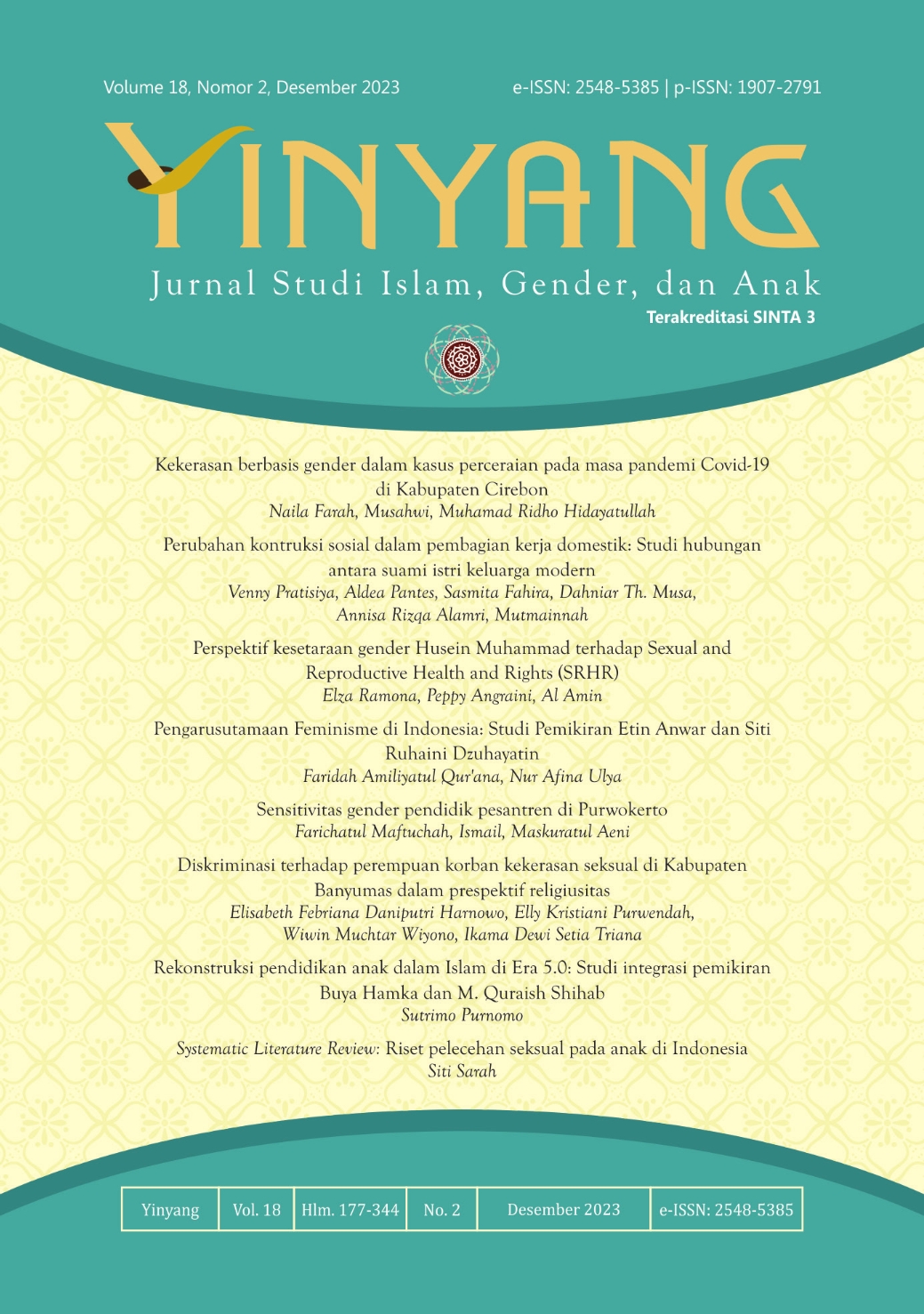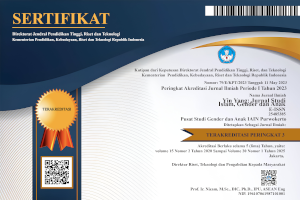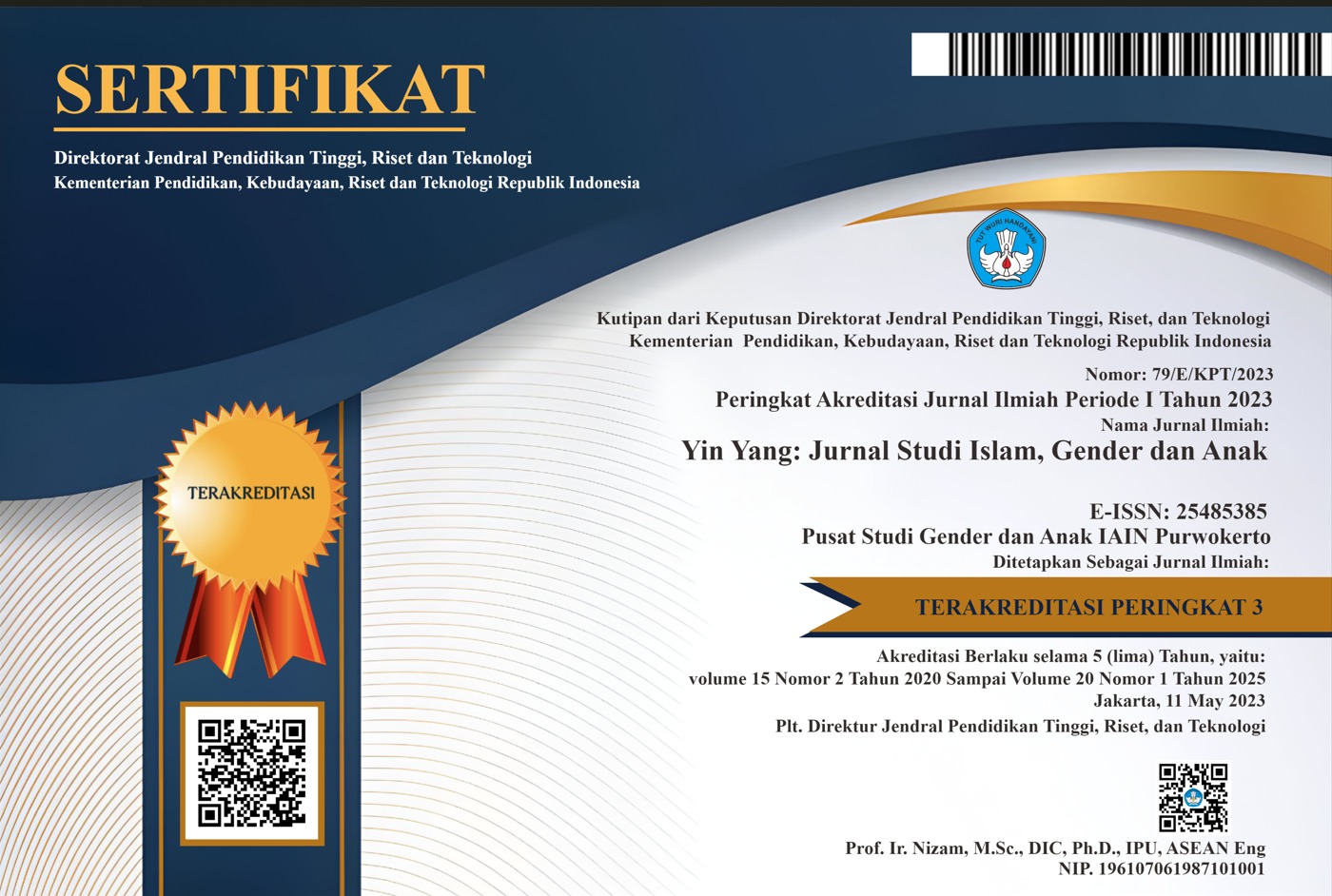Rekonstruksi pendidikan anak dalam Islam di Era 5.0: Studi integrasi pemikiran Buya Hamka dan M. Quraish Shihab
DOI:
https://doi.org/10.24090/yinyang.v18i2.8581Keywords:
Reconstruction, Children's Education, Islam, Buya Hamka, M. Quraish ShihabAbstract
The era of 5.0 has had an impact that is not entirely good, even advances in information and technology have become one of the causes of moral degradation in children. If this is allowed to continue, a younger generation will emerge who are intellectually superior but weak morally. This is at the same time an indicator of the failure of the world of education, because the ultimate goal of education is to create a moral generation. For this reason, efforts to anticipate moral degradation in children as a result of the 5.0 era must be carried out, including through the reconstruction of children's education in Islam. This study aims to offer readers a formulation of children's education in Islam in the era of society 5.0 through the integration of the thoughts of two Indonesian Muslim scholars, namely M. Quraish Shihab and Buya Hamka. This research is a qualitative research type which is library research by making a systematic review as a research approach. The findings illustrate that children's education in Islam in the 5.0 era can be done through four things, namely: First, strengthening the goal of creating humans as servants. Second, the strengthening of gratitude which is implemented in the spirit of talabul 'ilmi. Third, aqidah or monotheism education about the Oneness of Allah must be instilled from an early age. Fourth, the cultivation of good morals, especially devotion to parents and also to others and the environment, is used as the direction of children's education in Islam.Downloads
References
Alfian, Muhammad. (2019). Pemikiran Pendidikan Islam Buya Hamka. Jurnal Islamika: Jurnal Ilmu-Ilmu Keislaman. 19 (2), 89–98.
Anshori. (2008). Penafsiran Ayat-ayat Jender Menurut Muhammad Quaraish Shihab. Jakarta: Visindo Media Pustaka.
Faridah, Tsana Nur. (2021). Meningkatkan Karakter Generasi Muda di Era 5.0 Melalui Pembelajaran Pendidikan Kewarganegaraan Halaman. Jurnal Kependidikan. 5(3), 7310-7314.
Hamka. (1980). Falsafah Hidup. Medan: Pustaka Islamiyah.
Hamka. (1998). Tafsir Al Azhar Juz 27. Jakarta: Pustaka Panjimas.
Harun, Sulastri. (2021). Pembelajaran di Era 5.0. Prosiding Seminar Nasional Pendidikan Dasar: Merdeka Belajar dalam Menyambut Era Masyarakat 5.0, 265-276.
Indramawan, A. & Hafidhoh, N. (2019). Pendidikan Karakter Sebagai Upaya Meningkatkan Semangat Belajar. Prosiding Semdikjar III, 477-485.
Iqbal, Muhammad. (2010). Metode Penafsiran al-Qur’an M. Quraish Shihab. Jurnal Tsaqafah. 6 (2), 248-270.
Khaliq, Abdul. (2013). Pemikiran Pendidikan Islam Menurut Hamka. Tarbiyah Islamiyah. 3 (1). https://doi.org/10.18592/jt ipai.v3i1.1851
Moh. Rivaldi Abdul et al. (2020). Pembentukan Akhlak Dalam Memanusiakan Manusia: Perspektif Buya Hamka. Pekerti: Jurnal Pendidikan Islam Dan Budi Pekerti. 1 (1), 79–99, https://journal.iaingorontalo.ac.id/index.php/pekerti/article/view/1279
Nashir. (2015). Buya HAMKA dan Mohammad Natsir Tentang Pendidikan. Dirasat: Jurnal Manajemen & Pendidikan Islam. 1 (1), 99–123, https://doi.org/10.26594/dirasat.v1i1.507.
Nasikin, Muhammad & Khojir. (2021). Rekonstruksi Pendidikan Islam di Era Society 5.0 Cross-border Journal. 4 (2), 706-722.
Nizar, Samsul. (2008). Memperbincangkan Dinamika Intelektual dan Pemikiran Hamka Tentang Pendidikan Islam. Jakarta: Kencana Prenada Media Group.
Noer, Deliar. (1996). Gerakan Moderen Islam di Indonesia 1900-1942 Cet. VIII. Jakarta: LP3S.
Prasetiawati, Eka. (2017). Konsep Pendidikan Anak menurut Al-Qur’an Perspektif Muhammad Quraish Shihab. ADBIR : Jurnal Manajemen Pendidikan Islam. 5 (1), 116-131.
Primarni, Amie. (2022). Transformasi Filosofi Pendidikan Islam pada Pondok Pesantren di Era Society 5.0. Edukasi Islami: Jurnal Pendidikan Islam. 11 (1), 1177-1192. DOI:10.30868/ei.v11i01.2812.
Putra, Pristian Hadi. (2019). Tantangan Pendidikan Islam dalam Menghadapi Society 5.0 Jurnal Islamika: Jurnal Ilmu-Ilmu Keislaman. 19 (2), 99 – 110.
Rahayu, Komang Novita Sri. (2021). Sinergi Pendidikan Menyongsong Masa Depan Indonesia di Era Society 5.0. Edukasi: Jurnal Pendidikan Dasar. 2 (1), 87-100.
Rokhim, Ahmad Abdur & M. Yunus Abu Bakar. (2021). Studi Komparasi Konsep Pendidikan Anak dalam Islam Menurut Buya Hamka dan Abdullah Nashih Ulwan. Jurnal al-Murabbi. 6 (2), 73-91.
Rozi, Anang Fahrur. (2022). Urgensi Pendidikan Islam Non-Dikotomi di Era Society 5.0. Kuttab: Jurnal Ilmu Pendidikan Islam. 6 (1), 92-102.
Rusydi. T.t. Pribadi dan Martabat Buya Hamka Cet. III. Jakarta: Pustaka Panji Mas.
Salik, Mohamad. (2014). Mengembangkan Fitrah Anak Melalui Pendidikan Islam (Studi Atas Pemikiran Hamka). El-Qudwah, 4 (1), 1–11. http://ejournal.uinmalang.ac.id/index.php/lemlit/article/view/2713.
Salim, Agus. (T.t.). Kenang-Kenangan 70 Tahun Hamka. Jakarta: Yayasan Nurul Islam.
Santoso, Budi. (2023). Tantangan Pendidikan Islam Menuju Era Society 5.0: Urgensi Pengembangan Berpikir Kritis dalam Pembelajaran PAI di Sekolah Dasar. Jurnal Papeda. 5 (1), 54-61.
Shihab, M. Quraish. (2007). Secercah Cahaya Ilahi; Hidup Bersama Al-Qur’an. Bandung: Mizan.
Shihab, M. Quraish. (2009). Tafsir al Mishbah: Pesan, Kesan, dan Keserasian al Qur’an Vol.11. Bandung: Lentera Hati.
Silfia, M. (2018). Penguatan Pendidikan Karakter dalam Menghadapi Era Revolusi Industri 4.0. Digital Library UNIMED.
Susanto, A. (2009). Pemikiran Pendidikan Islam, Cet. I. Jakarta: Amzah.
Tim Penyusun. 1994. Ensiklopedi Islam Jilid II. Jakarta: PT Cipta IchtiarBaru Van Hoevwe.
Wiranti, Wulan. (2020). Studi Komparasi Konsep Pendidikan Akhlak Menurut Ibnu Miskawaih dan Hamka. Jurnal Al Makrifat. 5 (2), 32–57.
Downloads
Published
How to Cite
Issue
Section
License
Copyright (c) 2023 Sutrimo Purnomo

This work is licensed under a Creative Commons Attribution-ShareAlike 4.0 International License.
Authors who publish with this journal agree to the following terms: Authors retain copyright and grant the journal right of first publication with the work simultaneously licensed under a Creative Commons Attribution-ShareAlike 4.0 International License that allows others to share the work with an acknowledgment of the work's authorship and initial publication in this journal.


















